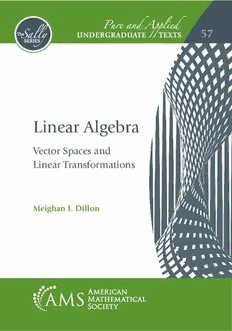Table Of Content57
Linear Algebra
Vector Spaces and
Linear Transformations
Meighan I. Dillon
Linear Algebra
Vector Spaces and
Linear Transformations
UNDERGRADUATE TEXTS • 57
Linear Algebra
Vector Spaces and
Linear Transformations
Meighan I. Dillon
EDITORIAL COMMITTEE
Giuliana Davidoff Tara S. Holm
Steven J. Miller Maria Cristina Pereyra
Gerald B. Folland (Chair)
Cover credit: GeorgePeters/DigitalVisionVectors via Getty Images.
2020 Mathematics Subject Classification. Primary 15-01.
For additional informationand updates on this book, visit
www.ams.org/bookpages/amstext-57
Library of Congress Cataloging-in-Publication Data
Names: Dillon,Meighan,1956-author.
Title: Linearalgebra: vectorspacesandlineartransformations/MeighanI.Dillon.
Description: Providence, Rhode Island : American Mathematical Society, [2023] | Series: Pure
and applied undergraduate texts, 1943-9334; volume 57 | Includes bibliographical references
andindex.
Identifiers: LCCN2022033447|ISBN9781470469863(paperback)|9781470472009(ebook)
Subjects: LCSH:Algebras,Linear–Textbooks. |Vectorspaces–Textbooks. |Matrices–Textbooks.
| AMS: Linear and multilinear algebra; matrix theory – Instructional exposition (textbooks,
tutorialpapers,etc.).
Classification: LCCQA184.2.D552023|DDC512/.5–dc23/eng20221013
LCrecordavailableathttps://lccn.loc.gov/2022033447
Copying and reprinting. Individual readersofthispublication,andnonprofit librariesacting
for them, are permitted to make fair use of the material, such as to copy select pages for use
in teaching or research. Permission is granted to quote brief passages from this publication in
reviews,providedthecustomaryacknowledgmentofthesourceisgiven.
Republication,systematiccopying,ormultiplereproductionofanymaterialinthispublication
ispermittedonlyunderlicensefromtheAmericanMathematicalSociety. Requestsforpermission
toreuseportionsofAMSpublicationcontentarehandledbytheCopyrightClearanceCenter. For
moreinformation,pleasevisitwww.ams.org/publications/pubpermissions.
Sendrequestsfortranslationrightsandlicensedreprintstoreprint-permission@ams.org.
(cid:2)c 2023bytheAmericanMathematicalSociety. Allrightsreserved.
TheAmericanMathematicalSocietyretainsallrights
exceptthosegrantedtotheUnitedStatesGovernment.
PrintedintheUnitedStatesofAmerica.
(cid:2)∞ Thepaperusedinthisbookisacid-freeandfallswithintheguidelines
establishedtoensurepermanenceanddurability.
VisittheAMShomepageathttps://www.ams.org/
10987654321 282726252423
In memory of John Loustau
Contents
List of Figures xi
Preface xiii
How To Use This Book xvii
Notation and Terminology xxi
To the Student xxiii
Introduction 1
Chapter 1. Vector Spaces 3
1.1. Fields 3
1.2. Vector Spaces 8
1.3. Spanning and Linear Independence 14
1.4. Bases 18
1.5. Polynomials 24
1.6. R and C in Linear Algebra 28
Chapter 2. Linear Transformations and Subspaces 31
2.1. Linear Transformations 32
2.2. Cosets and Quotient Spaces 35
2.3. Affine Sets and Mappings 41
2.4. Isomorphism and the Rank Theorem 44
2.5. Sums, Products, and Projections 47
Chapter 3. Matrices and Coordinates 55
3.1. Matrices 55
3.2. Coordinate Vectors 61
vii
viii Contents
3.3. Change of Basis 66
3.4. Vector Spaces of Linear Transformations 69
3.5. Equivalences 73
Chapter 4. Systems of Linear Equations 77
Introduction 77
4.1. The Solution Set 78
4.2. Elementary Matrices 83
4.3. Reduced Row Echelon Form 86
4.4. Row Equivalence 89
4.5. An Early Use of the Determinant 93
4.6. LU-Factorization 98
Chapter 5. Introductions 107
5.1. Dual Spaces 107
5.2. Transposition and Duality 112
5.3. Bilinear Forms, Their Matrices, and Duality 116
5.4. Linear Operators and Direct Sums 121
5.5. Groups of Matrices 126
5.6. Self-Adjoint and Unitary Matrices 130
Chapter 6. The Determinant Is a Multilinear Mapping 133
6.1. Multilinear Mappings 133
6.2. Alternating Multilinear Mappings 136
6.3. Permutations, Part I 139
6.4. Permutations, Part II 145
6.5. The Determinant 149
6.6. Properties of the Determinant 152
Chapter 7. Inner Product Spaces 157
7.1. The Dot Product: Under the Hood 157
7.2. Inner Products 162
7.3. Length and Angle 164
7.4. Orthonormal Sets 168
7.5. Orthogonal Complements 174
7.6. Inner Product Spaces of Functions 176
7.7. Unitary Transformations 182
7.8. The Adjoint of an Operator 187
7.9. A Fundamental Theorem 191
Contents ix
Chapter 8. The Life of a Linear Operator 199
8.1. Factoring Polynomials 199
8.2. The Minimal Polynomial 201
8.3. Eigenvalues 206
8.4. The Characteristic Polynomial 212
8.5. Diagonalizability 216
8.6. Self-Adjoint Matrices Are Diagonalizable 221
8.7. Rotations and Translations 223
Chapter 9. Similarity 231
9.1. Triangularization 231
9.2. The Primary Decomposition 234
9.3. Nilpotent Operators, Part I 242
9.4. Nilpotent Operators, Part II 245
9.5. Jordan Canonical Form 248
Chapter 10. GL (F) and Friends 255
n
10.1. More about Groups 256
10.2. Homomorphisms and Normal Subgroups 259
10.3. The Quaternions 264
10.4. The Special Linear Group 270
10.5. The Projective Group 274
10.6. The Orthogonal Group 281
10.7. The Unitary Group 285
10.8. The Symplectic Group 290
Appendix A. Background Review 297
A.1. Logic and Proof 297
A.2. Sets 301
A.3. Well-Definedness 306
A.4. Counting 308
A.5. Equivalence Relations 312
A.6. Mappings 315
A.7. Binary Operations 318
Appendix B. R2 and R3 321
B.1. Vectors 321
B.2. The Real Plane 324
B.3. The Complex Numbers and R2 326
B.4. Real 3-Space 328

